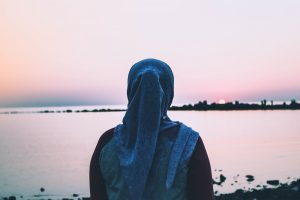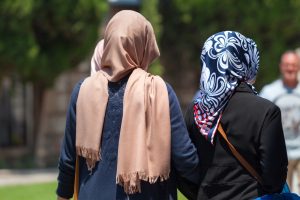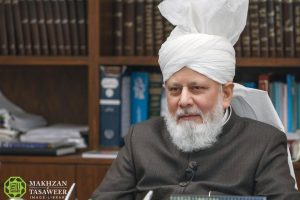The annual convention (Jalsa Salana) of the Ahmadiyya Muslim Community UK is a unique event that brings more than 35,000 participants from more than 110 countries to increase religious knowledge and promote a sense of peace and brotherhood.
While speakers discuss a range of religious topics and their relevance to contemporary society, the most distinguishing feature of this convention is that it is blessed by the presence of His Holiness Hazrat Mir-za Masroor Ahmadaba, the Head of the worldwide Ahmadiyya Muslim Community, delivering four faith-inspiring addresses over three days.
Journalist Sarah Linney attended Jalsa Salana for the first time in 2017 and published her thoughts on the event in our August 2017 issue – here, she returns to narrate her unique experience on the women’s only side of the convention and on being a Muslim woman in the west.
__________________________

Travel Stock | Shutterstock
Lajna Imaillah UK
As well as all being Britain-hating terrorists, Muslims are horrendous misogynists too – the men sadistic oppressors, the women mousey nonentities too terrified to speak from behind their burqas.
Sorry, sorry, I got confused there – that was meant to be the intro to my piece of Britain First propaganda. But seriously – bring up the subject of Islam with a few people you know and you’ll soon find many of them don’t consider it a religion that treats women well.
And hardly without cause. Many Muslim countries have serious issues with women’s rights – in Saudi Arabia, probably the most notable example, women are controlled by a male guardian, usually their father or their husband, for their whole lives. Until this year, when the rules were relaxed somewhat, they could not work, study or even see a doctor without his permission; in public, they must be covered head-to-toe.

Jose Ignacio Soto | Shutterstock
The abuse of women’s rights under Islamist fundamentalist regimes like the Taliban and ISIS is well documented. And even in the UK, cases like the murders of Celine Dookhran and Shafilea Ahmed, the latter by her own parents, certainly suggest that in some Muslim families, women and girls are still viewed as little more than chattels who only have the right to live as long as they surrender their independence.
So is this actually how Islam is supposed to be – or is it a case of people misinterpreting the teachings, accidentally or deliberately, for their own agenda?
Because it doesn’t tally at all with the Muslim women I know, nor indeed with the men. The idea of anyone trying to oppress my friends Faiza and Jamila is less plausible than the idea of Donald Trump giving up Twitter – and many of the Muslim men I’ve met exude gentleness, kindness and attentiveness. Do Muslim women really feel like second-class citizens – or are those of us who think there’s only one, western way to be emancipated actually the unenlightened ones?
This was one of the things I intended to find out at this year’s Jalsa Salana – the UK’s biggest Muslim convention, held on farmland in Hampshire in July and attended by almost 38,000 people from around the world.
The site is divided into men’s and women’s sections – you can read about my experiences of the men’s site here – and the men have already given me their take on the matter. Subby, who picked me up from the station, told me as we drove in:
‘Women in Islam have a lot of rights. They were given the right to own property and the right to vote by Mohammedsa, who made it very clear that daughters are just as important as sons. The first university was built by a Muslim lady.’
The University of Al Quaraouiyine in Fez, Morocco, is indeed the world’s oldest continuously operating educational institution, and was founded in 859 by Fatima Al-Fihri.
‘There was a whole culture before Islam where they believed that whereas a son would take care of your property and take your name forward, daughters were like a curse,’ explained Zain, one of my guides around the site. ‘The Holy Prophetsa replaced this culture totally.’
Subby added: ‘What has happened in the past 200 years is that some places have lost the Islamic spirit and gone back to what their culture was – so it does appear that the West has advanced but other countries are oppressing women.’

BigTunaOnline | Shutterstock
There was so much to see, do and read on the men’s side that it was around 6pm by the time I headed over to the women. As I slipped and slid through the mud (it had rained all day; the people who told me it was the ‘Muslim Glastonbury’ weren’t wrong), I was keen to see if the ladies would bear out the men’s words.
I was welcomed by Samia Ahmad, a science teacher from Guildford, and Sadia Khan, 32, who is originally from Toronto but now lives in south London (Samia won’t tell me her age.) Sadia’s greeting – ‘I love your eyeshadow!’ – got things off to a good start: not only do I love makeup, I’m well disposed to anyone who tells me it still looks nice after I’ve spent four hours outside in the drizzle.
Over the three days of the festival, there will be 10,000 women here – and just like on the men’s side, every aspect of the event is run by a team of around 2,000 volunteers. Women from all walks of life pile in to do everything from cleaning the toilets to security-checking everyone who comes onto the site. And a woman’s place is definitely not in the kitchen here – the one thing the men do for the women is the cooking, and with 30,000 meals a day to prepare, I didn’t see any women shedding any tears over renouncing that particular responsibility.
There are tents for everything from worship to clothes and jewellery shopping, three dining halls and a huge dormitory where up to 1,000 women can camp on-site, sleeping side by side on mattresses on the floor.
After a quick tour of some of the tents, the three of us sit down to talk about their status as women in Islam. According to Sadia – the more vocal of the two – the subjugation of women that happens in some Muslim countries and communities doesn’t actually derive from what Islam says.
‘A lot of it has to do with culture, not the proper teachings of Islam,’ she explains.
‘Islam was the first religion to give women the right to divorce and have an inheritance. It’s in the Quran: if a woman makes money it’s her own. Her husband has no right to that money. We’ve had those rights for 1,400 years; the Western world only got them within the last hundred years.’
But what about the hijab – the requirement for Muslim women to cover their hair, and dress in a way that doesn’t reveal their bodies, every time they leave the house or are in the presence of a man outside their close family?
In fact, although hijab has come to be shorthand for the headscarf Muslim women wear, it also has a much broader meaning: the Islamic requirement for both men and women to dress and behave modestly.
Muslim scholar Qasim Rashid explains: ‘The primary responsibility of observing hijab is not on women – it is on men. Too many men forget it applies to us first. Men are commanded not to stare at women and not to be promiscuous, and to observe modesty.’ Women are also told to do the same, of course – but the Qur’an mentions the requirements for men first.
And yet. I like my hair, and I would not want to cover it routinely with a headscarf. Do Muslim women not find such a requirement restrictive?

i7do | Shutterstock
Samia tells me she doesn’t – that it’s more about keeping a bit of mystery, something special between herself and the man she’s married to that the rest of the world’s males don’t get to see.
‘If you are displaying your beauty to everyone, there’s nothing special about it. A woman’s beauty is just for her husband and the people close to her – her father or her son,’ she said.
‘Here there is a concept that if your body is beautiful, you must show it off. People do look at you and judge you – but if you look at the teachings of Christianity and Judaism, they teach modesty for women too. We’re told to follow the example of Mary, the mother of Jesus, and she always covered her hair.’ (Men are also told to look to Mary as an example of modest and pious behaviour.)
‘Women feel more secure when they are covered up. But we can dress up as much as we want. And you never have to worry about a bad hair day,’ she added.
As someone whose hair has a mind of its own, I can’t deny that this last notion is appealing.
Sadia, who works in banking in central London, says she feels her hijab actually protects her from much of the negative attention women can receive – which, as any woman knows, can be deeply unpleasant.
‘Because I dress the way I do, people treat me with more respect, because that is what my hijab demands,’ she says. ‘They won’t make lewd comments or lewd jokes with me.
‘It’s nice when people can’t judge you on your appearance. They have to judge you on your personality, morals and values. In the workplace, that’s invaluable.’
And she agrees with Samia that it’s no bad thing when getting ready for work, either.
‘It’s one less thing to have to worry about on a Monday morning. My female colleagues really envy my hijab!’ she said. ‘I totally respect the rights of other women and their beliefs – they can reveal their bodies – but if I want to cover up they should respect that too.
‘I just got my hair permed, and my husband loves it. But I don’t feel the need to show it off to the whole world, cause it’s just for me.’
But what of the far more controversial burqa – banned in public in France and Belgium, and restricted in a number of other European and African countries? It’s one thing to cover your hair – but should anyone be allowed to cover their entire face, leaving only their eyes showing and totally obscuring their identity?
‘Our community feel that for administration purposes, you should show your face,’ Sadia said.
‘But again, it’s up to that woman. If she doesn’t want to show her face, she shouldn’t have to. Things are a lot stricter with hijab in the Middle East and they may not feel comfortable. It’s not up to us to judge.’

Clive Childers | Shutterstock
In the interests of propriety, Muslims are also not allowed to shake hands with the opposite sex – something I wished I’d known before jabbing my hand fruitlessly at one poor man.
‘In Islam men and women are equal. We can apply the teachings of Islam to our lives today but still be modern and integrated,’ Sadia added.
‘The point of a hijab is to show that I am a Muslim and these are my morals. If you put certain modest limits in place there will be less degradation. Prevention is better than cure.
‘Hijab has never stopped us from pursuing our dreams and ambitions. I don’t think it would be possible to oppress me.’
And she also believes there is a sisterhood among Muslim women.
‘When Muslim women pass each other we automatically say salaam and greet each other,’ Sadia says.
‘There is so much unity and bonding going on here. We have our own team who do the cleaning, the security, the serving of food, and everyone is equal – doctors and nurses are cleaning the toilets. We are not dependent on men for anything.’

Lajna Imaillah UK
After spending a bit more time with Sadia and Samia and being treated to a piping hot bowl of my favourite daal [lentils], I’m left thinking about my own perceptions of what freedom and equality for the sexes really means. Our discussion forces me to acknowledge that in my love of fashion and beauty, much as it is about pleasing myself (no one else would want my dress sense), there is also a larger element of vanity than I like to admit to.
Am I always honest with myself about how judgments based on appearance affect me? Would I be perceived differently if no one could see my hair, or anyone else’s – would my self-image be better or worse? Tighter restrictions on dress and behaviour must surely diminish some problems – but do they constitute a fundamental loss of freedom to which those problems are preferable? And do they bring problems of their own?
Of course, there’s a solution that neatly allows you to cover your head without hiding your hair: wear a hat.
……………………………………………………..
About the Author: Sarah Linney is a freelance journalist and the editor of news, features and opinion website The Loop (theloopjournalism.wordpress.com). She has previously worked for the Kent Messenger Group and Kent on Sunday, and as a freelance copywriter.
………………………………………………………
Views expressed in this article are those of the author and do not necessarily represent or reflect the views of The Review of Religions or the Ahmadiyya Muslim Community.




Add Comment